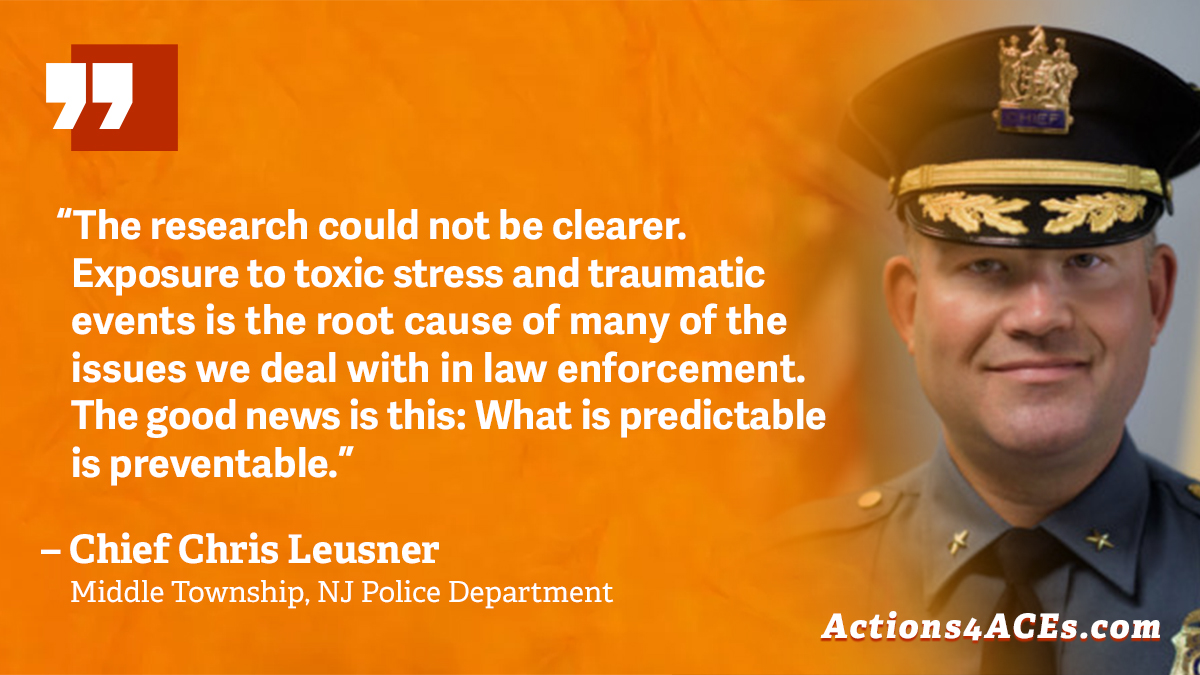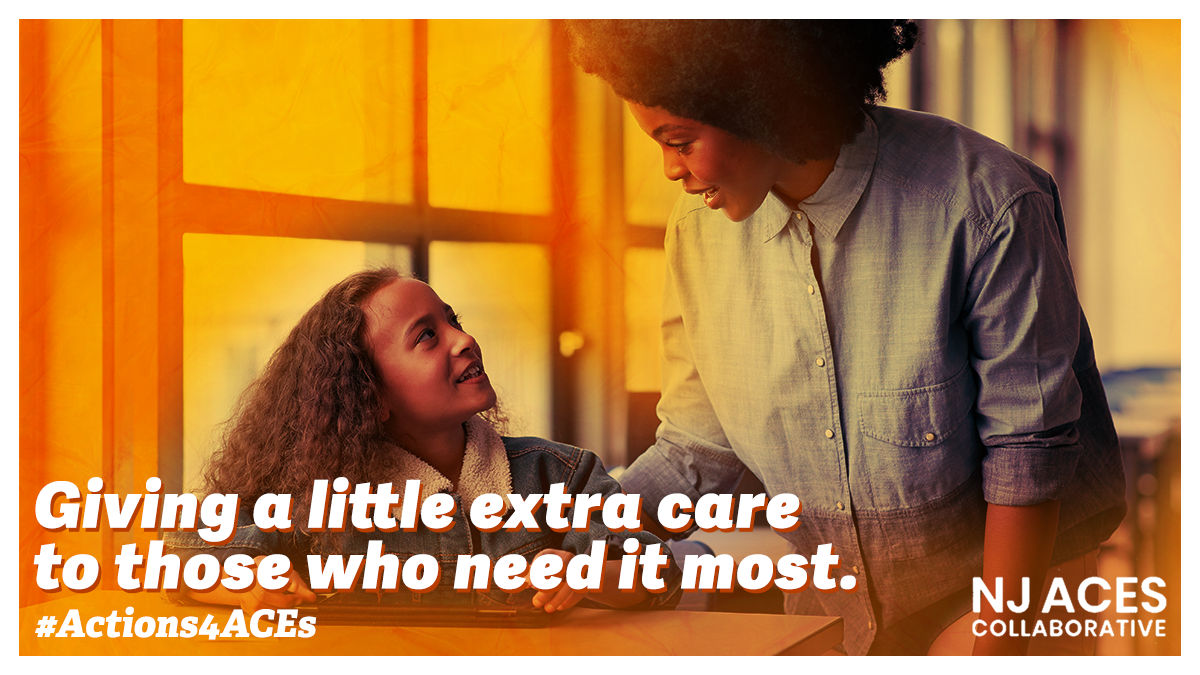👋 Welcome to Starting Early. Every other week, we spotlight new reports, useful news, and engaging interviews with people doing important work in the field, and interesting takes on issues that matter.
As we shared in our recent conversation with Dr. Nadine Burke Harris and Dave Ellis, traumatic events such as experiencing parental separation, violence, abuse or neglect, and toxic relationships during childhood can create invisible scars, often damaging mental health well into adulthood. Dr. Burke Harris, California’s first surgeon general, has an audacious goal: to cut adverse childhood experiences (ACEs) and toxic stress in half within one generation.
We share Dr. Burke Harris’ vision and believe one of the first steps to increase awareness of adverse childhood experiences (ACEs) is with tools for prevention and resilience that can help the health of children. With that in mind, we have proudly launched a new campaign: Actions 4 ACEs.
We connected with Chris Leusner, a police chief in New Jersey; and Ben David, a district attorney in North Carolina. Both are leading bold new prevention initiatives to address the impact of trauma. 👏
Please read on and click through the links to go deeper.
1 Big Thing: Positive Relationships Can Buffer Childhood Trauma and Toxic Stress

While we often center discussions around adversity as a deficit (the more adversity you face, the worse its effects), we also know that key positive experiences help us heal. ❤️
Many people are familiar with the landmark CDC-Kaiser Permanente ACEs study linking early adversity to the most harmful, long-lasting, and expensive societal and health challenges.
But: When we think only about deficits, adversity, trauma, or toxic stress, we miss an important part of the picture: A person’s complete history includes their positive experiences.
A 2019 Johns Hopkins University study was the first large-scale look into Positive Childhood Experiences (PCEs) – experiences that not only promote optimal development, but also help protect kids from the harmful effects of trauma and resulting adult mental health issues.
Why it matters: The study shows the big difference that Positive Childhood Experiences (PCEs) make. Those who experienced 4-plus ACEs, and had up to 2 PCEs, had a more than 60% chance of experiencing depression or poor mental health, while those with the same number of ACEs — but 6-7 PCEs — had a 21% chance of depression or poor mental health.
The study linked 7 childhood experiences to good mental health in adults:
- Ability to talk with family about feelings
- Family support in difficult times
- Enjoyment of participating in community traditions
- Feeling of belonging in high school
- Feeling of support by friends
- Two non-parent adults who genuinely care
- Feeling safe and protected by an adult at home
One key group: Because pediatricians are trusted by families, they gain important information about nurturing relationships in a child’s life. Armed with that information, a pediatrician can make more useful recommendations.
Dr. Renée Boynton-Jarrett at Boston Medical Center, a Burke Foundation trustee, shared, “Maybe mom has a significant mental health condition, but that child has two aunts who are very engaged, and a grandmother who is also very engaged. If a child seems to lack solid relationships with adult relatives, doctors might suggest parents or guardians look outside the family for support systems that can take root.”
The big picture: Children with a higher number of PCEs grow into adults able to seek and get care and support, which improves overall well-being even if mental illness and adversity are present.
2. Dispatches from the Field: The Call for Law Enforcement to Address ACEs

Meet Chris Leusner, Middle Township’s Chief of Police since 2009. This caring and compassionate national leader in ACEs-informed approaches is a major force in the statewide Handle With Care program, which unites police and educators toward the common goal of reducing childhood trauma. He shared:
“When I looked at a lot of the situations police dealt with, I recognized that the interventions we were doing were important and should continue, but if I was true to the definition of community- oriented policing, I had to consider the root cause. The root cause is trauma, and kids are exposed to trauma in a lot of cases.”
We discussed:
- The impact of the CDC-Kaiser Permanente ACEs study on police interventions
- Police officers’ experiences and wellness
- Learnings and experiences from Handle With Care
“I think the suicide rate among police officers ranks second, after veterans in this country. Along with substance abuse and alcoholism, there are a lot of really negative health outcomes among police officers. I talked about this with them: ‘Think about the trauma that we’ve seen, think about some of our colleagues that have struggled with it, and then think about a child that doesn’t have the support system of a police department, that doesn’t have a brain that’s fully developed.’”
Read the full interview here.
3. Actions 4 ACEs Campaign Launch

This month, the NJ ACEs Collaborative launched a strengths-based campaign, Actions 4 ACEs, to build awareness about ACEs among primary responders to children – initially focusing on 200,000 education professionals and 30,000 law enforcement officers in New Jersey.
The greater a community’s fluency with the concept of ACEs, the greater its collective capacity to recognize symptoms, support families at risk, and provide the kind of care that enables children to thrive. The campaign strives to increase public understanding of ACEs through media outreach, discussion groups, and community events.
Tangible resources: The campaign uses language evoking kindness and empathy to encourage professionals who interact with young children to step up through small but impactful acts and encourage professionals to go deeper with further training and supports around ACEs.
The bottom line: The campaign provides an opportunity to create a common language around ACEs — not just for educators, law enforcement officers, and welfare workers, but for everyone who touches children’s lives.
Compassion before curriculum: “This year, more than any other year in education, taught us that compassion must come before curriculum. The Actions 4 ACEs campaign embodies this philosophy. In all honesty, I had little knowledge of the longer-term physical and emotional effects that ACEs present to our children, and when I took the ACEs test myself, I realized I’d had four of those Adverse Childhood Experiences. I always knew that some of my trauma was mirrored in my students, but my connection with the ACEs Collaborative has conceptualized this idea.” — Angel Santiago, 2020-2021 New Jersey State Teacher of the Year.
4. Innovative North Carolina Program Involves Judges in Addressing ACEs
Adversity and trauma are prevalent within the juvenile justice system: Juvenile offenders are 4 times more likely to have experienced 4 or more ACEs.
The North Carolina Administrative Office of the Courts recently launched a pilot effort in partnership with the Bolch Judicial Institute at Duke Law School to create and administer a first-of-its-kind education program for state court judges and court administrators on the effects of juvenile trauma.
Liz Winer, president of the Winer Family Foundation and a funder of the pilot said, “Through the new ACEs trainings for judges, we are building a new court system that will offer concrete practices judges can adopt to understand the origin and lasting effects of intergenerational trauma and toxic stress. By educating court judges and juvenile court officials who work with families, we can connect those affected by ACEs to programs that put them on a path to not return to the courtroom as a victim or offender.”
In the podcast, All Things Judicial, New Hanover and Pender County District Attorney Ben David shares that social determinants of health are the same as the root causes of crime. But when we identify the “gateway drug” as childhood trauma, the response is much different.
- The court system has a unique opportunity to become trauma-informed given three major circumstances now confronting all justice officials: the COVID-19 pandemic, the opioid epidemic, and racial reckoning.
What’s next: North Carolina Supreme Court Chief Justice Paul Newby recently launched the Task Force on ACEs-Informed Courts which will host its first quarterly meeting in August.
By the numbers:
- This month, the Bolch Institute will host 12 district court judges for pilot training on ACEs and use their feedback to improve subsequent training for all district court judges
- The North Carolina Administrative Office of the Courts will provide ACEs training to over 6,000 judicial branch employees
Focus on prevention: “As I tell people: We use science to solve cases and to prove them beyond a reasonable doubt, so we should use science in preventing cases. I think that is the mantra moving forward. How can we use data to understand that there are predictable outcomes? If we do nothing or if we do something, we change the arc of kids futures.” — District Attorney Ben David
